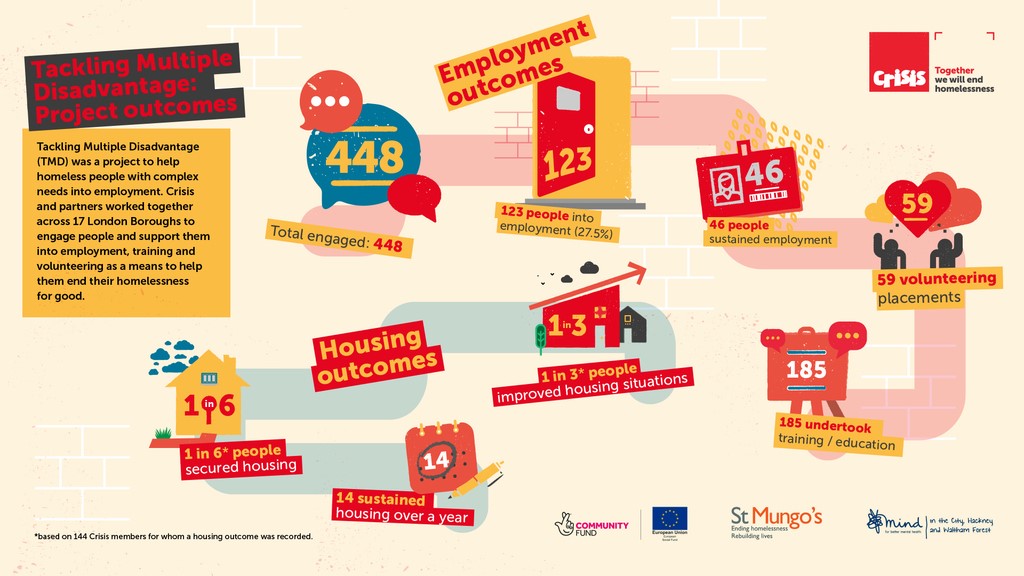Why a safe and stable home is crucial for people getting and keeping a job

04.12.2020
 For some people the experience of homelessness can be compounded by multiple challenges. These challenges are often rooted in past trauma, poverty or experiences such as time spent in local authority care or prison. Being homeless can, in turn, make many of these problems even harder to resolve and put people under considerable strain.
For some people the experience of homelessness can be compounded by multiple challenges. These challenges are often rooted in past trauma, poverty or experiences such as time spent in local authority care or prison. Being homeless can, in turn, make many of these problems even harder to resolve and put people under considerable strain.
Over the past three years Crisis, in partnership with St Mungo’s, Thames Reach and Mind in the City, Hackney and Waltham Forest, has delivered a project which provides personalised employment and training support for people facing multiple challenges to help them move out of homelessness for good. The Tackling Multiple Disadvantage (TMD) project (a Building Better Opportunities project funded by The National Lottery Community Fund and the European Social Fund) was designed to address participants’ support needs while developing the stability, confidence and skills to access employment.
The evaluation report published today by the Learning and Work Institute (L&W) highlights key learning that can help Crisis and others develop services to support people facing homelessness to secure employment and move towards ending their homelessness.
Having a safe and stable home was key to people getting and keeping a job. The evaluation found that housing insecurity was damaging to people’s mental health. People receiving support from the TMD project talked about being unable to relax or focus on addressing other priorities, including finding work, if their living situation was unsafe or dangerous. This was demonstrated through the outcomes for the project as well. People were more likely to keep their job if they had a secure place to live – 48% of jobs were sustained for six months, which rose to 68% of jobs among participants who had secured more stable housing.
The type of support available on the project was a key strength for working with people with higher support needs. Participants received a highly-personalised coaching service which was not time limited, including some in-work support once a job was secured. The support helped to build people’s resilience, trust and confidence. As one participant said:
“My confidence had taken a beating, I lost all confidence, and as soon as I met [my coach], I started to get my confidence back. She started to build my confidence up slowly.”
The TMD project also worked with multiple services including wellbeing, functional skills such as IT, a recovery college and welfare benefits advice. This helped people address the multiple barriers and challenges they were facing in accessing employment:
“I couldn’t have asked for anyone better. [My coach] gave me a lot of opportunities, the volunteering, the gardening, the Roll-On Monday, the CV. She always tried chasing the therapy referral, emailing, calling, leaving messages, in front of me and afterwards.”
There are also challenges the project can learn from. Coaching staff highlighted persistent gaps in provision, particularly in advice for complex immigration cases and drug and alcohol misuse. Whilst some in-work support was provided, the design of the funding meant this was not as extensive as it could be. Other evidence also points to the gap in in-work support and how vital this is for people who are recently returning to work after experiencing homelessness.
In many cases people’s experiences and outcomes were constrained by how the current system is designed and the lack of stable housing. Alongside personalised employment support, we need greater investment in social housing and approaches like Housing First to prevent people experiencing homelessness in the first place so we can ensure everyone has a stable foundation from which to rebuild their lives.
Take a look at the full report.
For media enquiries:
E: media@crisis.org.uk
T: 020 7426 3880
For general enquiries:
E: enquiries@crisis.org.uk
T: 0300 636 1967
